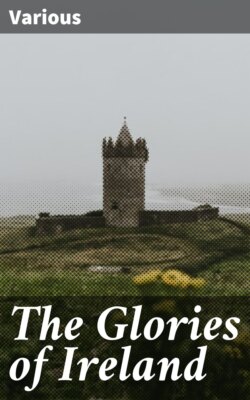Читать книгу The Glories of Ireland - Various - Страница 63
На сайте Литреса книга снята с продажи.
MEDICAL SCIENCE.
ОглавлениеVery brief note can be taken of the many shining lights in Irish medical science. Robert James Graves (1796–1853), F.R.S., after whom is named "Graves's Disease", was one of the greatest of clinical physicians. His System of Clinical Medicine was a standard work and was extolled by Trousseau, the greatest physician that France has ever had, in the highest terms of appreciation.
William Stokes (1804–1878), Regius Professor of Medicine in Trinity College, and the author of a Theory and Practice of Medicine, known all over the civilized world, was equally celebrated.
To these must be added Sir Dominic Corrigan (1802–1880), the first Catholic to occupy the position of President of the College of Physicians in Dublin, an authority on heart disease, and the first adequate describer of aortic patency, a form of ailment long called "Corrigan's Disease". "Colles's Fracture" is a familiar term in the mouths of surgeons. It derives its name from Abraham Colles (1773–1843), the first surgeon in the world to tie the innominate artery, as "Butcher's Saw", a well-known implement, does from another eminent surgeon; Richard Butcher, Regius Professor in Trinity College in the seventies of the last century.
Sir Rupert Boyce (1863–1911), F.R.S., though born in London, had an Irish father and mother. Entering the medical profession, he was assistant professor of pathology at University College, London, and subsequently professor of pathology in University College, Liverpool, which he was largely instrumental in turning into the University of Liverpool. He was foremost in launching and directing the Liverpool School of Tropical Medicine, which has had such widespread results all over the world in elucidating the problems and checking the ravages of the diseases peculiar to hot countries. It was for his services in this direction that he was knighted in 1906.
Sir Richard Quain (b. Mallow 1816, d. 1898), F.R.S., spent most of his life in London, where he was for years the most prominent physician. He wrote on many subjects, but the Dictionary of Medicine, which he edited and which bears his name, has made itself and its editor known all over the world.
Sir Almroth Wright (b. 1861), F.R.S., is the greatest living authority on the important subject of vaccino-therapy, which, indeed, may be said to owe its origin to his researches, as do the methods for measuring the protective substances in the human blood. He was the discoverer of the anti-typhoid injection which has done so much to stay the ravages of that disease.
